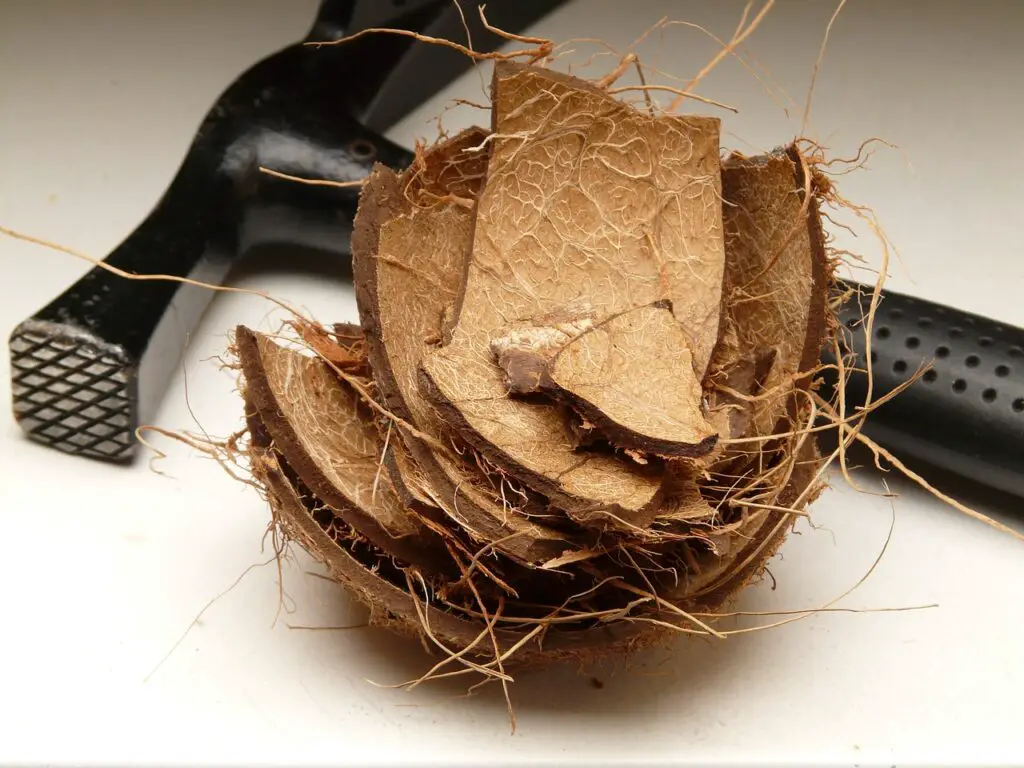Hey there, fellow dog lovers! We’ve all had those moments where we catch our four-legged friend nibbling on the most unexpected items. So, if your dog ate coconut shell recently, don’t stress – you’re not alone! I’ve spent years understanding our canine buddies, and I’m here to guide you through this.
Let’s know what you need to know when those furry misadventures involve coconut shells.
Understanding the Canine Curiosity:
Why would a dog eat a coconut shell, you wonder? Dogs are naturally inquisitive. That hard texture of the coconut shell combined with its aromatic scent can be intriguing. But while some parts of the coconut are edible and even beneficial (have you ever wondered, “Can dogs eat coconut?” We have an entire article on that!), the shell poses different concerns.
Unpacking the Coconut’s Appeal:
Coconuts, as a whole, have properties that can be beneficial for our furry pals. For example, coconut oil has health benefits for dogs, and the meat can be a delightful treat in moderation. But when a dog ate coconut shell, it’s a different scenario.
Potential Risks of Eating Coconut Shell:
It’s not just about satisfying curiosity; there are genuine risks:
- Choking Hazard: Broken pieces of the shell can lodge in the throat.
- Digestive Obstruction: Swallowing large fragments might lead to blockages.
- Internal Damage: Sharp shell parts can scrape or pierce their insides.
Signs to Watch Out For:
Post the coconut shell snacking, observe your dog for:
- Vomiting or diarrhea
- Loss of appetite
- Abdominal discomfort or bloating
- Lethargy or changes in behavior
Immediate Actions:
- Stay Composed: First, keep calm. Your dog senses your stress.
- Inspect Their Mouth: Gently check for any remaining shell fragments.
- Keep an Eye Out: Notice any signs of distress or discomfort.
- Vet Check: When unsure, a veterinarian’s advice is indispensable.
Long-Term Monitoring:
Ensure they’re expelling the shell fragments in the following days. Dark or bloody stools are a red flag.
Safety Above All:
Anticipation is essential. Make your space safe for dogs by placing items like coconut shells out of their paws’ reach. Provide them with alternatives like dog-friendly toys.
Alternative Safe Snacks for Dogs
Every dog owner has been there – that moment when you catch your pooch nibbling on something unexpected. Coconut shells? Who would’ve thought! But here’s the thing, dogs are naturally curious. Their world revolves around exploring new textures and flavors, and sometimes, their choices might baffle us.
But, instead of just scratching our heads and wondering why, let’s find safer alternatives to satiate that canine curiosity.
- Tough Chew Toys: Dogs love to gnaw. It’s in their DNA. Getting them a good, sturdy chew toy can keep them away from unwanted items. Plus, it’s a win-win. They get to chew, and their teeth get a nice clean!
- Yummy Dog Treats: Crunchy dog biscuits or soft chewy ones, treats are always a hit. It’s like their version of candy, minus the sugar and plus all the good stuff.
- Veggies to the Rescue: Some dogs love a good carrot or a slice of cucumber. It’s crunchy, it’s juicy, and it doesn’t come with potential hazards like coconut shells. But remember, introduce new foods slowly. We don’t want any upset puppy tummies.
- Dental Chews: Think of these as a toothbrush and a treat rolled into one. They chew, they enjoy, and their teeth shine brighter. Magic, right?
So next time your dog gives you that “I want to chew” look, you’ll be ready. And as for coconuts? Maybe stick to the main content, like the tasty inside parts. As we discussed in our article “Can dogs eat coconut?”, the fleshy part is okay in moderation. But let’s keep those shells out of reach.
Conclusion:
Our dogs never cease to surprise us, do they? From their quirky habits to their unexpected snack choices, there’s always something new to discover. If your dog ate coconut shell, remember: while coconuts can offer some benefits, the shell has its risks. Always stay informed and prioritize your pet’s safety.
And for those who still wonder about the other parts of the coconut, feel free to check our comprehensive guide on “Can dogs eat coconut?”. After all, knowledge is the key to ensuring our furry friends live their best lives.
Frequently Asked Questions About Dogs and Coconut Shells
Q: Why did my dog eat a coconut shell?
Dogs are naturally curious and might be attracted to the hard texture and aroma of the coconut shell.
Q: Is the coconut shell toxic to dogs?
No, coconut shells aren’t toxic, but they pose potential choking hazards and can cause digestive issues if ingested.
Q: What should I do immediately if my dog ate a coconut shell?
Stay calm, inspect their mouth for any fragments, observe them for signs of distress, and consult a vet if needed.
Q: Are there any long-term effects of dogs eating coconut shells?
If ingested, large shell pieces can lead to digestive obstructions or internal damage. It’s essential to monitor your dog for any concerning symptoms.
Q: Can dogs eat other parts of the coconut?
Yes, dogs can eat the meat of the coconut in moderation. If you’re curious about more details, our guide “Can dogs eat coconut?” provides a deeper dive.


